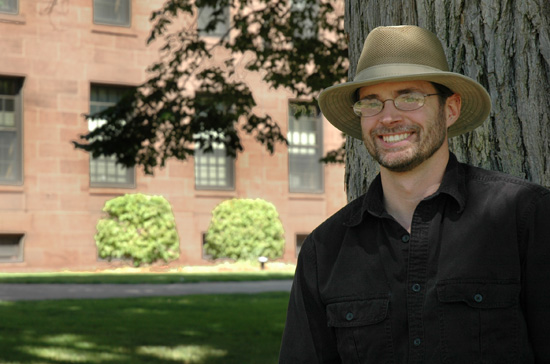“Mac” Expert on Call for Wesleyan Computer Problems
 |
| Todd Houle, Macintosh Specialist for Information Technology Services, says e-mail-related questions are the ones he gets asked most frequently. |
| Posted 07/11/07 |
| Q: Todd, when did you come to Wesleyan?
A: I came to Wesleyan in the summer of 1997 as the Macintosh Specialist for the Information Technology Services Desktop Support Team. While different responsibilities have come and gone, Ive always been in our Desktop Support group. I also manage a couple of Mac servers such as our license server and file servers for a few departments. Q: Each academic and administrative department is assigned a Desktop Support Specialist. What departments do you oversee? A: I am responsible for Athletics, Office of Public Affairs, Wesleyan University Press and Classics as well as the Macintosh computers in other areas, such as English, Philosophy, the Office of the President and the College of Letters. Q: When someone has a problem with a computer, what is the process to get the problem resolved? A: It certainly depends on the problem, but the basic process is starting to resolve it from general to specific. Is it hardware or software? Is it a problem with the program or operating system? Using different methods, I can narrow down the cause until I can identify it and replicate it then figure out how to resolve it. Q: What are the most common problems Wesleyan employees have with their computers? A: Many of the questions people have are about e-mail. I dont believe its because e-mail programs are a problem, but because that is one thing everyone is doing every day in many different ways. Home access is another popular question these days. People want to check email and work from home. Q: And what are some of the oddball cases? A: Oddball cases are almost always about rare programs or programs being used in non-standard ways. I recently had a question about why Eudora wouldnt e-mail a giant video file to another user. Other times Microsoft Word randomly removes all toolbars. But having been doing this work for 15 years, there are not too many questions I havent come across before. Q: Are you mostly in, or out of the office on calls? A: In the past couple of years, Ive been able to do more remote support thanks to the software included with Mac OS X. Working only over the phone is almost always too difficult. However, with remote control software, the user and I can both see the screen at the same time. Q: How did you acquire your computer knowledge? And what interests you about these machines? A: I began working in this field because it was a natural move for me. Ive been fortunate enough to have computers around my whole life and understanding how they work was easy for me. As I went through college, people frequently turned to me for help with whatever problem they were working on. I started working officially in computer support during my sophomore year in college. Over the years, Ive worked hard to expand my knowledge by reading and trying new things so that I could remain a resource for other people. Q: Where did you go to college and what was your major? A: I went to the University of Connecticut, majoring in philosophy. Q: How does philosophy relate to computer technology? A: Philosophy is more closely related to computers than people think in one class we wrote simple programs as we discussed symbolic logic. Both computers and philosophy require logical, analytical thinking. Q: Who else is a member of the Desktop Support Team, and you interact with each other often? A: The Desktop Support staff is made up of myself, Phil Dean, Harriett Epstein, John Hammond, Sean Gomez, Shawn Hill and Ben Jackson. As the issues we tackle are very similar, we work very closely to share knowledge about problems weve researched. Q: In 2006, you taught a Continuing Studies course on film editing using Apples iMovie. Do you enjoy teaching too? A: I really enjoy teaching classes and hope to do it often in the future. While the iMovie class was my first time with the CRST program, Ive taught iMovie and others many times within the ITS Training program. Ive also been able to present at many conferences, such as NERCOMP the NorthEast Regional Computing Program, so that I could teach my peers about different tools and techniques Ive found. Q: You are considered a Mac expert. How did you acquire PC knowledge? How many people at Wesleyan use one or the other? Is it half and half? A: Anyone working in computers will at some point work on a Windows PC. As many of the things computers do are similar, the procedure for repairing them is similar. Different departments are dependent more on one platform or the other the sciences and humanities use more Macs, while the economics and government departments tend to use more Windows computers. Administrative departments use almost all Windows computers, as the move to PeopleSoft a few years ago required it. Now that PeopleSoft is Web-based, we are beginning to see more Macintosh computers in administrative computing. Overall, faculty are about 50/50 split. Administrative computing is about 90 percent Windows and 10 percent Mac- with the number for Macs quickly growing. Q: Aside from computers, what are your hobbies? A: I have a great family at home who I love to spend time with. My kids are very involved in sports and music my wife and I try to join them in those activities. My son is a great soccer player. Now hes much better than me so Im not much of a challenge for him but its still fun. I also coach my daughters soccer and softball teams and am involved in Boy Scouts with my son. |
| By Olivia Drake, The Wesleyan Connection editor |

